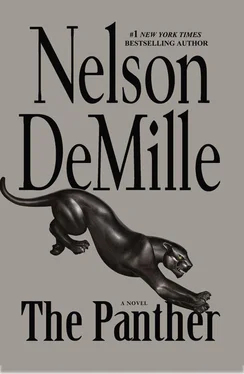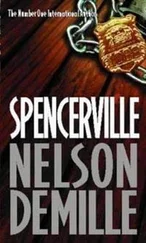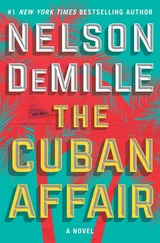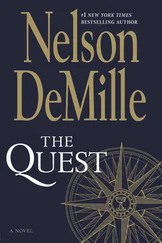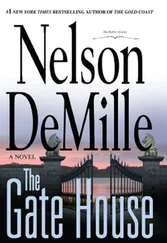Nelson Demille - The Panther
Здесь есть возможность читать онлайн «Nelson Demille - The Panther» весь текст электронной книги совершенно бесплатно (целиком полную версию без сокращений). В некоторых случаях можно слушать аудио, скачать через торрент в формате fb2 и присутствует краткое содержание. Жанр: Триллер, на английском языке. Описание произведения, (предисловие) а так же отзывы посетителей доступны на портале библиотеки ЛибКат.
- Название:The Panther
- Автор:
- Жанр:
- Год:неизвестен
- ISBN:нет данных
- Рейтинг книги:5 / 5. Голосов: 1
-
Избранное:Добавить в избранное
- Отзывы:
-
Ваша оценка:
- 100
- 1
- 2
- 3
- 4
- 5
The Panther: краткое содержание, описание и аннотация
Предлагаем к чтению аннотацию, описание, краткое содержание или предисловие (зависит от того, что написал сам автор книги «The Panther»). Если вы не нашли необходимую информацию о книге — напишите в комментариях, мы постараемся отыскать её.
The Panther — читать онлайн бесплатно полную книгу (весь текст) целиком
Ниже представлен текст книги, разбитый по страницам. Система сохранения места последней прочитанной страницы, позволяет с удобством читать онлайн бесплатно книгу «The Panther», без необходимости каждый раз заново искать на чём Вы остановились. Поставьте закладку, и сможете в любой момент перейти на страницу, на которой закончили чтение.
Интервал:
Закладка:
At least, I thought, I was going into the jaws of the beast armed, finally, with the truth, as revealed by Al Rasul. The truth is good, except when it’s bad.
And there was another truth that had occurred to me-another reason we were being asked to go to Yemen, and it also had to do with the past-but not The Lion-something else that happened years ago, that involved Kate and the CIA.
I put that thought in the back of my mind, but not too far back. The answers to Why me, why Kate, and why Yemen, were in Yemen.
PART III
CHAPTER FIFTEEN
Bulus ibn al-Darwish, al-Numair, The Panther, wearing the white robes and shiwal of a Bedouin, stood before a gathering of his fighters; forty-two jihadists, armed with AK-47 assault rifles and shoulder-fired rocket launchers.
It was past the midnight hour, but he could see his men sitting cross-legged in the bright light of a waxing half moon, and he could see, too, the flat, desolate landscape of rock and powdery soil, stretching to the star-filled horizon.
The Panther said to his men in a loud, clear voice, “This night, you will achieve a great victory for Islam!”
The men cheered and raised their rifles in the air.
“You will kill the infidel and cleanse the sacred soil of Islam with their blood!”
Another cheer.
The Panther looked out at his soldiers. They were mostly new recruits, hastily trained in the mountain camp. But among them were four hardened jihadists from Afghanistan, and two officers of the defeated Army of Iraq.
These two former officers had met the Americans in battle and had fled their homeland after the defeat, and they were now here in Yemen to avenge that humiliation. What they lacked in the spirit of holy war, they more than compensated for in hate.
One of the officers, Behaddin Zuhair, a former captain of the elite Iraqi Guard, would lead the attack on the American-owned Hunt Oil installation. The other Iraqi, Sayid al-Rashid, would be his second in command.
The Panther had great faith in these combat-proven soldiers, and he knew they would give courage to the young recruits. With these two Iraqi officers, and with the four battle-hardened jihadists from Afghanistan within the ranks, The Panther saw no reason to lead this attack against the American oil facility himself.
The Panther reminded his men, “The security forces of this foreign compound are all paid mercenaries-men who have no loyalty to the Americans, only to the American dollar. They will surrender and beg for mercy, or they will run-or they will die at your hands!”
The men cheered more loudly.
The Panther knew, as did his officers and men, that the Americans had also hired a hundred men of the Yemeni National Security Bureau to provide additional protection for the oil installation-the housing units, the offices, the trucks, the machinery, and the pipelines and pumping equipment. These one hundred para-military policemen were well paid by the Americans but poorly trained by the government in Sana’a, poorly equipped, and poorly motivated. And, as The Panther recalled from his dealings with these men at the Bilqis ruins, they were easily intimidated and more easily bought.
He reminded his fighters, “The police camp is outside the perimeter of the oil company, on the north side, and you will attack from the south.” He also assured his men, “The police will not engage you. And you will not provoke them.” He smiled and said, “They will be sleeping like lambs and will hear nothing.”
The men laughed, but Bulus ibn al-Darwish could sense that it was forced, nervous laughter.
Men on the edge of battle, he knew, were fearful. This was understandable. But faith overcame fear. Leadership overcame inexperience. And that was his job-to foster faith and show leadership.
He said to his fighters, “You have been shown the plans of the defenses of this American colony on the soil of Islam. You know that this place is weak, and you know the secrets of these defenses. And you know that the mercenaries who guard this place for the Americans are infidels without heart or soul. And the Yemeni laborers who are with them have sold themselves to the Americans and are unworthy of God. They are all sheep to be slaughtered this night!”
The men stood and cheered wildly.
Captain Behaddin Zuhair stood to the side and watched his men, then looked at his chief, Bulus ibn al-Darwish, who called himself The Panther, though some called him al-Amriki-the American, which al-Darwish did not like.
Behaddin Zuhair thought that al-Darwish had great presence and spoke well. The Panther had become a legend since he planned the successful attack on the American warship in Aden Harbor, so the men listened to him, trusted him, and revered him. Al-Darwish, thought Zuhair, was a great inspirer of men, a smart planner, and perhaps a great thinker. But he was not a great military strategist. In fact, he knew nothing about war. If the truth be known, this attack on a fortified compound, executed with poorly trained troops, had all the ingredients of disaster. But no one would tell that to Bulus ibn al-Darwish.
The men were still cheering, and The Panther motioned them to sit.
He let the silence fall over the desert, and he looked out at the star-filled night. A soft, hot wind came from the north, from Ar Rub al Khali, the Empty Quarter, the desert of the blazing sun and the massive, shifting dunes of scorching sand where even scorpions died.
It was here where God put the oil, and here where the Americans came to drain it from the soil of Islam. And The Panther was moved to say, “It is here where the Americans and their paid servants will die. And the dunes will march south and cover their bones and cover every trace of them, and all evidence that they were here and have polluted the sacred soil of Yemen and Islam.”
The men raised their voices in agreement.
The Panther shouted, “You will be victorious!”
The men stood again and shouted, “Victory!”
“You will show no mercy!”
“No mercy!”
“You will kill the infidels and their servants! No one escapes alive!”
The men cheered and continued cheering.
Captain Zuhair, too, cheered, as did his lieutenant, Sayid al-Rashid. But they exchanged glances with each other. These officers, who had seen battle against the Americans, against the Kurds and the Iranians, and against the Iraqi rebels who fought against the great leader Saddam Hussein-these two men knew victory and defeat, and they knew fear, cowardice, bravery, and death. The Panther knew none of this.
Zuhair looked at his men. Too young-not in their years, but in their hearts and their heads. Too many idealists and religious scholars who came from comfort. Too many Saudis who had seen battle only on television.
Well, thought Zuhair, what they lacked in hardness, perhaps they made up for in faith and zeal.
Zuhair looked again at Bulus ibn al-Darwish. The Amriki, too, must have had these thoughts and doubts. Which perhaps was why al-Darwish was not leading the attack tonight.
The Panther called out to his men, “You have gathered here from many nations of Islam to engage in jihad. Tonight will be the first victory, followed by many more, until the Americans are driven from Yemen. And then we will turn to Sana’a and annihilate the corrupt government men who have invited the Americans into holy Yemen.” The Panther raised his voice and said, “We will hang the ministers and the generals from the lampposts of Sana’a and celebrate our victory in the palace of the puppet president, Ali Abdullah Saleh!”
The men stood again and shouted, “Death to Saleh!”
The Panther smiled and raised his arms, but his thoughts were elsewhere. He himself would not be leading this attack, though some among his jihadists might question why he was not joining them. In fact, Captain Zuhair had raised this issue.
Читать дальшеИнтервал:
Закладка:
Похожие книги на «The Panther»
Представляем Вашему вниманию похожие книги на «The Panther» списком для выбора. Мы отобрали схожую по названию и смыслу литературу в надежде предоставить читателям больше вариантов отыскать новые, интересные, ещё непрочитанные произведения.
Обсуждение, отзывы о книге «The Panther» и просто собственные мнения читателей. Оставьте ваши комментарии, напишите, что Вы думаете о произведении, его смысле или главных героях. Укажите что конкретно понравилось, а что нет, и почему Вы так считаете.
